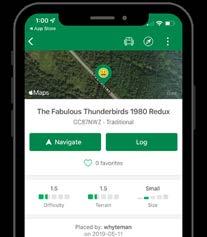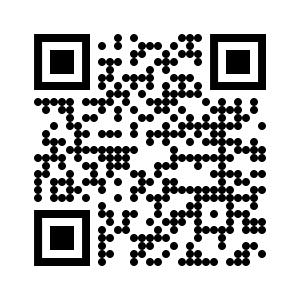
4 minute read
Learn to Geocache
article by LAUREN GUND
Have you ever daydreamed about going on a hunt for a hidden treasure? Today, people around the world are doing just that through geocaching. Geocachers seek out treasures hidden by other players while exploring interesting locations.
Advertisement
At its most basic level, geocaching is a game where players use mobile devices, Global Positioning Systems (GPS), and direction-finding techniques to track down a container, or “cache”. Caches may contain small trinkets or a logbook for players to sign to mark their find. Once signed, the cache is returned to the original spot. There are a number of geocache locations around East Hill, including over a dozen managed by the East Hill Neighborhood Association. But before you start hunting, it’s important to know the rules and lingo of a true geocacher.
The Rules
If you plan on joining in on the adventure, make sure to follow these rules to keep the game fun and safe for everyone:
1. Watch out for muggles
Yes, you are right...they are the same type of muggles from Harry Potter. A non-geocacher is considered a muggle, similar to nonwizards being called muggles. Even though all the items are placed in legal places, with no context, it looks odd if you are searching in a tree or a bush to someone passing by.
2. In order to take, you must leave something
Depending on the size of the cache, they sometimes have a reward or treasure in them. You can only take something from the cache if you can exchange it with another item of equal value. Also, people of all ages are playing, so make sure what you leave is family-friendly. Part of the fun is seeing what other people leave behind. Small trinkets and coins are popular.
3. Check the logbook
It is common for caches to have a logbook with them. Logbooks are records of everyone who has found the cache beforehand. If the cache is too small for exchanging items, it will just have a logbook, while bigger ones typically have both. When you find a cache, don’t forget to log yourself being there! It’s always fun to see if you know anyone when reading it.
4. Report damages and thefts
If you notice anything about the cache is damaged or any of the contents inside are gone, make sure to report it back to the app. This will alert the owner, who can replace or fix the cache.
5. Don't move the caches
Since each geocache is logged by its coordinates, make sure you keep it in the same place it was found. If you think the container is in the wrong spot, email the owner directly or make a comment on the log to notify the owner. It might be tempting to hide the cache in a new place, but it's important to remember these aren't for taking. If you think of a better place, try hiding one yourself!

The Lingo
BYOP: "Bring Your Own Pen/Pencil". An acronym often used by geocache owners to communicate to other geocachers that you will need to bring your writing utensil in order to sign the cache logbook.
Cache: A shortened version of the word geocache.
Cacher: Also known as Geocacher. One who participates in geocaching.
CITO: "Cache In Trash Out" is an ongoing environmental initiative supported by the worldwide geocaching community. Since 2002, geocachers have been dedicated to cleaning up parks and other cachefriendly places around the world.
Coordinates: A pair of numbers (latitude and longitude) that pinpoint an exact position, or waypoint, on the Earth.
Difficulty and Terrain (or D/T): Geocaches are rated in two categories, each designated on a 5-point scale (in half-point increments). Difficulty relates to the mental challenge of finding a geocache, while Terrain describes the physical environment. The higher the number, the more difficult.
DNF: "Did Not Find". An acronym used by geocachers to state that they did not find a cache.
FTF: "First to Find". An acronym written by geocachers in physical cache logbooks or online when logging cache finds to denote being the first to find a new geocache.
Logbook: A physical record of everyone who has found a geocache. Usually made of paper, logbooks come in many different sizes, shapes, and formats.
Micro: The smallest geocache size. Micros are about the size of a film canister, and sometimes smaller.
Muggle: A non-geocacher. Based on "Muggle" from the Harry Potter series, which is a non-magical person.
Multi-Cache: A Multi-Cache involves two or more locations. The final location is a physical container.
Download the App
geocaching.com/play












